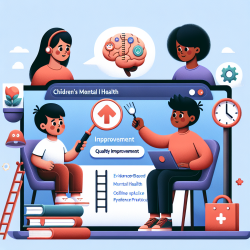In the realm of child welfare, kinship care has emerged as a preferred alternative to traditional foster care. This is particularly true for Black families, where cultural ties and familial willingness often place children with relatives rather than unrelated caregivers. However, Black kin caregivers face unique challenges that require tailored support and interventions. The recent study titled "Black Kin Caregivers: Acceptability and Cultural Adaptation of the Family Check-Up/Everyday Parenting Program" sheds light on how practitioners can adapt existing parenting programs to better serve this demographic.
The Importance of Cultural Adaptation
Cultural adaptation is crucial in ensuring that parenting programs resonate with the values, beliefs, and traditions of Black kinship families. The study highlights that while existing interventions like the Family Check-Up/Everyday Parenting Program (FCU/EDP) are effective, they need modifications to address the specific needs of Black kin caregivers. Practitioners must understand these cultural nuances to provide meaningful support.
Key Findings from the Study
- Cultural Relevance: Participants found the FCU/EDP program culturally appropriate but suggested more hands-on activities and self-care components.
- Effective Communication: Breaking down requests into manageable tasks was highlighted as a crucial skill learned from the program.
- Family Camp Format: Delivering the program in a family camp setting was beneficial, offering a unique environment for practicing new skills.
Implications for Practitioners
The study's findings offer several insights for practitioners seeking to improve their skills in working with Black kinship families:
- Emphasize Hands-On Learning: Incorporate more interactive and practical activities in training sessions to enhance understanding and application of parenting skills.
- Address Self-Care Needs: Acknowledge the stressors faced by kin caregivers and provide resources for self-care to prevent burnout.
- Culturally Sensitive Facilitation: Engage facilitators who share cultural backgrounds with participants to build trust and empathy.
- Leverage Community Networks: Utilize community resources like churches for recruitment and support, recognizing their role in providing social and emotional backing.
Encouraging Further Research
This study opens avenues for further research into culturally adapted interventions. Practitioners are encouraged to explore additional ways to tailor programs to diverse cultural contexts. Understanding the unique strengths and challenges faced by Black kin caregivers can lead to more effective support strategies.
Conclusion
The adaptation of parenting programs like FCU/EDP for Black kin caregivers is a step towards more inclusive child welfare practices. By integrating cultural considerations into program design and delivery, practitioners can enhance their effectiveness in supporting these families. As we continue to learn from ongoing research, it is essential to remain committed to developing culturally sensitive interventions that address the needs of all families involved in kinship care.
To read the original research paper, please follow this link: Black Kin Caregivers: Acceptability and Cultural Adaptation of the Family Check-Up/Everyday Parenting Program.










